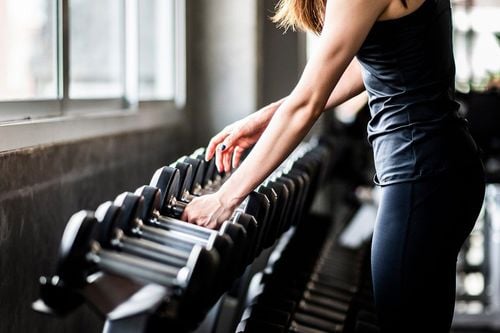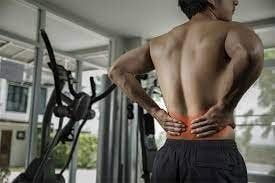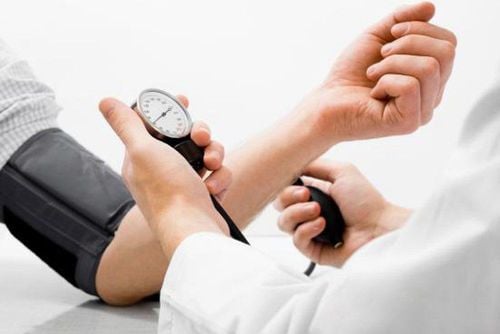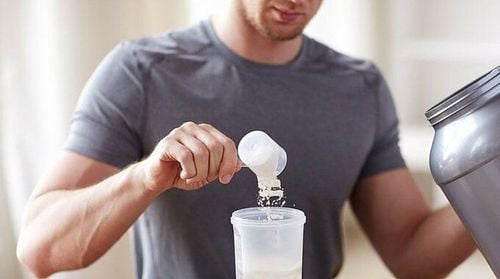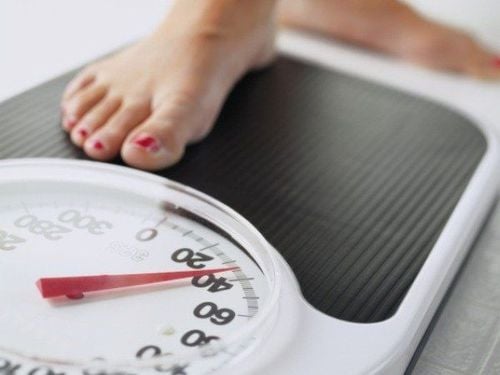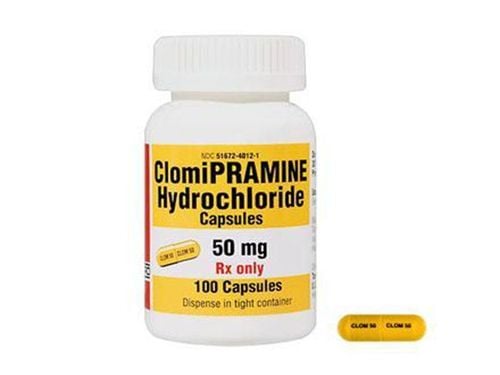This is an automatically translated article.
To become stronger, faster and stronger, you have to work out more. They help with muscle growth, fat loss, improved insulin sensitivity, and reduced inflammation. But you need to give your body time to recover from a workout, and those good changes happen before you start working out again. All workouts, especially gym ones that tire you out, cause micro-damage to muscle cells. Here are some guidelines to help you recover from the gym.1. Principles of muscle recovery after exercise
Despite what many people may read on some fitness blogs, there is no better way to help our muscles recover than by eating healthy foods and getting enough sleep.Living an overall healthy lifestyle is the single most important step we can take to maximize our muscle recovery. No recovery method can make up for poor nutrition and lack of rest. Many people believe that they need expensive supplements to get results from their workouts. While some supplements have benefits, we won't be able to maximize our performance without taking care of the basics.
In this article, we'll give you 15 scientifically proven tips to maximize muscle recovery and help build a fitness program that's more tailored for you.
Tips related to muscle recovery after the gym can be divided into 5 aspects, including:
Food Drinks Supplements Life habits Things to avoid Remember that the following tips are aimed at Aim to give exercisers an idea of how they can improve their muscle recovery, but they are by no means a comprehensive list that gym goers need to keep track of every single point. Each person's body type, fitness goals, and current fitness level all play a role in determining the best approach to recovery. Some techniques, such as contrast baths, can help recovery, but their effects are minimal and may only be suitable for professional athletes.

Cần bổ sung đầy đủ dinh dưỡng cần thiết cho việc tập luyện
The time it takes for muscles to recover after a workout depends on the fitness level and difficulty of each person's training process. The volume, intensity and duration of our workout all play a role in determining how much of an effect it has on the body.
After a relatively light workout, our muscles can recover in 24 hours, while with a heavier workout this can take two to three days. High-intensity workouts can even take longer to recover.
Other factors that can affect a practitioner's recovery time include:
Sleep The amount of nutrients the practitioner receives The types of stress the practitioner faces The process of performing exercises involving involving many different muscle groups or the individual effort of the practitioner in each training session It is important that the body takes time to fully recover from a workout. Exercise can create muscle damage for the practitioner. Only during recovery can muscles repair the small tears that form during exercise. Our bodies also need time to get rid of the lactic acid produced during strenuous exercise which makes them feel sore and tired. If you don't give your muscles time to recover, you run the risk of injury.
2. Tips for muscle recovery after gym
2.1. About food:
Protein After WorkoutWhen we exercise, proteins - the main building blocks of muscle fibers are damaged. Consuming protein after a workout can help provide the body with the raw materials it needs to repair these muscle damage. Research has found that supplementing with 20 to 40 grams of protein, or about 0.4 to 0.5 g/kg (0.9 to 1.1 g/lb) of body weight, is enough to maximize muscle growth.
Pre-workout protein
Pre-workout protein supplements can help increase muscle protein synthesis. As with post-workout recommendations, many reliable studies have found that 0.4 to 0.5 g/kg (or about 0.9 to 1.1g/lb) of body weight is Optimum needed for pre-workout protein supplementation.
Carbohydrates after a workout
Our muscles store carbohydrates in the form of glycogen for energy. During short periods of time and intense exercise, muscles use this glycogen as their primary form of energy. If you need to quickly restore glycogen levels in less than four hours, such as when doing back exercises, the International Society of Sports Nutrition recommends a glycemic index (GI) above 70. White rice , potatoes, and sugar are three examples of carbs in this GI range.
Eat an overall balanced diet
An overall healthy diet can ensure that gym goers won't develop any nutrient deficiencies that could impair recovery. recovery of their muscles. As a general rule, this means:
Reduce processed foods Eat more fruits and vegetables Get at least 1.4 to 1.8 grams of protein per kilogram of body weight (0.6 to 0.8 g/lb)
2.2. About drinks
Stay hydratedDehydration can reduce the ability of muscles to repair themselves. The body is especially susceptible to dehydration if exercising in hot or humid conditions. The American College of Sports Medicine recommends that bodybuilders drink between 0.4 and 0.6 liters of water for every 0.5 kg they lose during exercise.
Cherry juice
Recent studies have found that drinking cherry juice after exercise can reduce inflammation, muscle damage and muscle pain caused by exercise. More research is still needed to prove the effects of cherry juice, but many of the studies published to date have shown promise. The typical dose used in the study is 480 milliliters per day (about 1.6 ounces).
2.3. About supplements
Creatine monohydrateCreatine is one of the most widely researched supplements in the gym world. Scientists think it has the potential to help improve muscle strength when combined with endurance training. In addition, many studies have also found that creatine can help athletes recover from intense exercise by helping to reduce muscle damage and inflammation, as well as aiding in glycogen replenishment. reserves for their muscles.
Protein powder
Protein powder is one of the most convenient methods of adding more protein to an athlete's diet. Many protein powders contain the full spectrum of essential amino acids. Whey powder and collagen are two popular options.
2.4. Life habits
Get more sleepEnough sleep gives our muscles time to recover after a workout. People who exercise intensely need even more rest than the average person. Some professional athletes are said to sleep 10 hours or more every night.
Research has found that sleep deprivation can impair muscle recovery by impairing the body's inflammatory response and the production of hormones that support muscle growth.
Massage
Many athletes incorporate massage in their training to reduce muscle soreness. A 2020 review of multiple studies found that massage has a small but significant effect on improving flexibility and reducing slow-onset muscle soreness after you exercise.
Wearing tight clothing
Wearing tight clothing has become popular among athletes over the past few decades. There have been several studies looking at their effectiveness in accelerating post-exercise recovery. For example, a study conducted in 2019 found that the bodybuilders participating in the study had a significant reduction in muscle recovery time compared to others. In the study, athletes wore the clothes for 24 hours and then alternated between 12 hours of rest and 12 hours of wearing them for a total of 96 hours.
Contrast bath therapy
Contrast bath therapy requires the practitioner to alternately soak in warm and cold water. This temperature change stimulates the contraction and expansion of blood vessels and alters the heart rate of the practitioner.
Scientists have found that contrast bath therapy can help reduce muscle soreness after a workout. However, the results obtained are limited and may only be relevant to athletes.
Cryotherapy
Cryotherapy is a technique where the body is exposed to extremely cold temperatures for several minutes. Research has found that it can speed recovery by reducing pain, inflammation, and muscle fatigue after performing vigorous physical activity or hitting the gym.
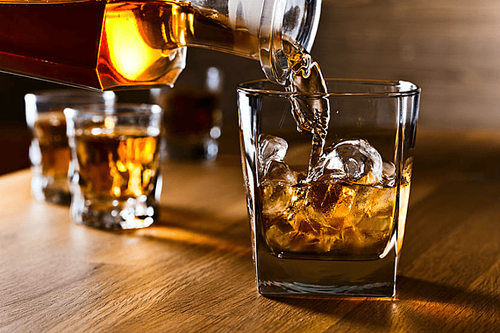
Tránh các loại đồ uống có cồn để việc tập luyện và phục hồi cơ sau tập gym được hiệu quả
2.5. Habits to avoid
AlcoholAlcohol consumption is harmful to anyone's health. Scientists have found that drinking alcohol after cycling reduces the ability of muscles to replenish glycogen after endurance training. Alcohol also reduces protein synthesis in our muscles.
Tobacco
Smoking has a negative impact on our musculoskeletal system. Although there is a limited amount of research on the effects of smoking on muscle recovery, many scientists suggest that smoking is associated with an increased risk of muscle injury. Smoking is also associated with an increased risk of developing joint disease and an increased risk of fractures.
2.6. Prevent injury during muscle recovery
The basis of any physical exercise is a gradual increase in intensity or volume over time. If we are in a hurry, we risk injury or overtraining. Different coaches have different philosophies when it comes to training. Many people agree that students should raise the bar in their training sessions but don't let themselves fall into a state of total burnout. Even world-class athletes have strategies for timing their workouts at peak intensity. Exercises should be designed so that the practitioner alternates exercises for different muscle groups as a good way to increase recovery time between workouts.Athletes who train for specific sports, like sprinters or Olympic jumpers, often work out the same body parts almost every day. They are often strategic about how to set up their exercise program. And often alternate high-intensity and low-intensity days to give the muscles time to recover.
If we don't allow our muscles to fully recover from exercise, we are putting ourselves at risk of injury. Muscle damage can range from mild to complete tearing. If you don't see an improvement in your fitness level or if your muscles constantly feel inflamed and sore, you may need to take more time to recover from your workout. Whether you're training to stay fit or a competitive athlete, the best way to maximize your muscle recovery is to stick to a healthy diet and get enough sleep. No other recovery technique can make up for bad habits in these two areas.
Please follow the website ( www.vinmec.com ) for more information on health care instructions, which we will update regularly.
Please dial HOTLINE for more information or register for an appointment HERE. Download MyVinmec app to make appointments faster and to manage your bookings easily.
Reference sources: getthegloss.com, healthline.com



